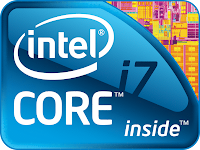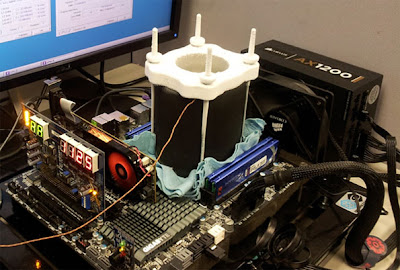 The
8.58GHz achieved by a liquid nitrogen-cooled Bulldozer, but
professional overclocker Hicookie did manage to set a new record for
Core i7 3930K by reaching 5.6GHz -- with the help of the aforementioned
Dippin' Dots refrigerant. Hicookie unlocked the overclocker achievement
with the help of an X79 motherboard from Gigabyte,
which also gets some recognition for being the first such board to
reach a multiplier of 57. The super-speedy i7 getting pushed to the
brink of destruction, head on after the break.
The
8.58GHz achieved by a liquid nitrogen-cooled Bulldozer, but
professional overclocker Hicookie did manage to set a new record for
Core i7 3930K by reaching 5.6GHz -- with the help of the aforementioned
Dippin' Dots refrigerant. Hicookie unlocked the overclocker achievement
with the help of an X79 motherboard from Gigabyte,
which also gets some recognition for being the first such board to
reach a multiplier of 57. The super-speedy i7 getting pushed to the
brink of destruction, head on after the break.
"Renowned overclocker 'Hicookie'
achieved a new high clock speed on the Intel Core i7 3930K processor by
cranking the chip past 5.6GHz using a Gigabyte GA-X79-UD3 motherboard, the first mobo in the world to achieve a mulitplier of 57x. There was a bit of a scandal with Gigabyte recently when a YouTube video showed one of its X79 boards going up in smoke. Gigabyte
released a BIOS update for several of its X79 boards to prevent such
incidents from happening, and there were outcries that the new F7 BIOS
would ... [reduce] overclocking performance; Hicookie's achievement
should erase those concerns."
Understand why overclocking risks instability
The reason you can overclock
without raising the voltage is that there is a voltage "guard band,"
which is like a safety margin. The ways of reducing that guard band,
because it's wasted energy. But that guard band is there for a good
reason. Typically the critical paths in the chip (those with the longest
propagation delay, which limit the safe clock speed) are a bit faster
than the clock period. But that's only true whe the voltage is stable.
If the voltage droops, then the propagation delay of those paths will
increase, possibly too much, and you get incorrect computation. Voltage
droops occur when circuits suddenly start switching a lot, demanding
more current, or in other words, the effective impedence of the circuit
drops, and by V=IR, for the current being supplied by the voltage regulator
at that instant, the voltage inside the chip will drop. The regulator
cannot respond instantly, so a guard band is provided so that the
maximum droop never brings the instantaneous voltage below a certain
margin. If you overclock without raising voltage, then your CPU will work
fine most of the time, but certain workloads will cause wide swings in
current demand, and if you execute one of those, you may crash your
system.
This is why memory tests are worthless for stability testing, because due to cache
miss latency, the current demand is relatively low and stable. Prime
number generators are also not so great, because their current demand is
relatively high and stable. I know that some of the SPEC and PARSEC
benchmarks have some wild behavior, like FFT, for instance, or anything
that has a lot of barrier synchronization. For the regular user, what's
likely going to happen is that you'll get random such events where
variation in cache hits and vector computation phases will cause significant spikes in current, and your game will crash.



















0 comments:
Post a Comment